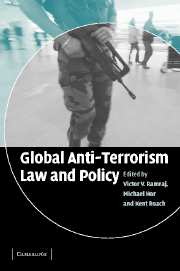Book contents
- Frontmatter
- Contents
- List of contributors
- Acknowledgements
- 1 Introduction
- PART ONE Theoretical Perspectives on Anti-Terrorism Law and Policy
- PART TWO A Comparative Study of Anti-Terrorism Measures
- PART THREE Anti-Terrorism Law and Policy in Asia
- 13 Law and terror: Singapore stories and Malaysian dilemmas
- 14 Indonesia's Anti-Terrorism Law
- 15 The Philippines: the weakest link in the fight against terrorism?
- 16 Japan's response to terrorism post-9/11
- 17 Legal and institutional responses to terrorism in India
- 18 Enacting security laws in Hong Kong
- PART FOUR Regional Cooperation
- PART FIVE Anti-Terrorism Law and Policy in the West
- PART SIX Anti-Terrorism Measures in Africa, the Middle East and Argentina
- Index
15 - The Philippines: the weakest link in the fight against terrorism?
Published online by Cambridge University Press: 21 July 2009
- Frontmatter
- Contents
- List of contributors
- Acknowledgements
- 1 Introduction
- PART ONE Theoretical Perspectives on Anti-Terrorism Law and Policy
- PART TWO A Comparative Study of Anti-Terrorism Measures
- PART THREE Anti-Terrorism Law and Policy in Asia
- 13 Law and terror: Singapore stories and Malaysian dilemmas
- 14 Indonesia's Anti-Terrorism Law
- 15 The Philippines: the weakest link in the fight against terrorism?
- 16 Japan's response to terrorism post-9/11
- 17 Legal and institutional responses to terrorism in India
- 18 Enacting security laws in Hong Kong
- PART FOUR Regional Cooperation
- PART FIVE Anti-Terrorism Law and Policy in the West
- PART SIX Anti-Terrorism Measures in Africa, the Middle East and Argentina
- Index
Summary
Terrorism has become a franchise. Its manufacturers had astutely recognized early on that the southern part of the Philippines is an ideal market. The Philippines is not a very large country but it has played a significant role in the spread of terrorism even beyond the boundaries of Asia. The country's location, history and geopolitics offered an ideal breeding ground for terrorism to spread. The same factors that made it attractive to terrorists, however, offer significant potentials that could be tapped by the Philippine authorities to make the country play an equally significant role in the fight against terrorism. To make this happen, it is important that the government of the Philippines acknowledges the true extent of the problem within its boundaries, proclaims a commensurate policy and exhibits true political will.
While the rest of the countries in the region are busy apprehending and trying suspected terrorists, the Philippines achieved unprecedented embarrassment when one of the region's most wanted terrorists, Indonesian Fathur Roman Al Ghozi, escaped from the national headquarters of the Philippine National Police. Al Ghozi was suspected of masterminding the 30 December 2001 bombing of a commuter train that resulted in the death of more than fifty individuals.
Al Ghozi was subsequently killed following a massive manhunt but his escape highlighted the Philippines' weakness when it comes to dealing with terrorism: there is an official policy but it is lacking when it comes to implementation and sustainability.
- Type
- Chapter
- Information
- Global Anti-Terrorism Law and Policy , pp. 307 - 326Publisher: Cambridge University PressPrint publication year: 2005
- 1
- Cited by

